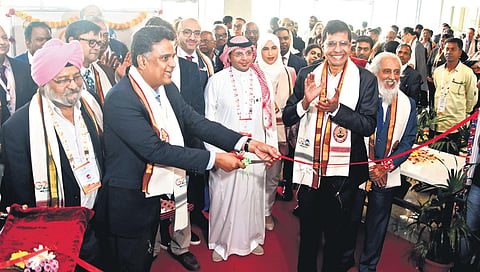

CHENNAI: The teaching and learning materials for the foundational stage have been prepared to reflect the policy spirit of the National Education Policy (NEP) and are likely to be released within a month, said union school education secretary Sanjay Kumar.
“All the books will be rewritten to reflect the policy spirit of NEP. We have come out with teaching and learning materials for the first five years and, hopefully, it will be launched in the latter part of this month (February). It will be sent to the state SCERTs and they will be requested to customise it as per their needs, he added.
As per the NEP released in 2020, the 10+2 schooling system in the country will be replaced with a new 5+3+3+4 system. It will consist of the foundational stage (3 to 8 years), preparatory stage (8 to 11 years), middle stage (11 to 14 years) and secondary stage (14 to 18 years). Speaking to the media, Sanjay Kumar said that the new system is expected to be rolled out in 12 to 18 months.
“All the National Curriculum Frameworks for the new system will be released and textbooks will be developed by NCERT accordingly. It will be shared with the states,” he said speaking to the media after the first-day meeting of the G20 education working group.
He added, by 2030, the country will have a uniform B.Ed syllabus with a duration of four years, as the duration of the course varies in different states. “Training of teachers is important to ensure the quality of education. Only when we have the best teachers, will we have the best outcomes. At present, we have programmes like NISHTHA and Integrated Teacher Education Programme (ITEP) for this,” he said.
When asked about Tamil Nadu coming up with a separate state educational policy and its stand against NEP, Kumar said that education is part of the concurrent list. “There are 14.8 lakh schools across the country of which only 2,000 schools are run by the central government and the rest are governed by 68 state boards. NEP focuses on bringing back joy into education and strengthening the foundation of learning,” Kumar added.
Citing an example, he said that almost all private schools have the concept of preschool, but the same system is not available in the government sector. NEP proposes students to have three years of preschool before Class 1. By the time the students reach Class 2, they will have certain competencies in reading, writing and arithmetical skills.
Stressing the need for the state and centre to work together, union higher education department secretary Sanjay Murthy, said that best practices like Nan Mudhalvan, which ensures academic and industry collaboration, have opened avenues to discover which type of models can be rolled out across the country.
‘15 lakh students enrolled in Naan Mudhalvan scheme’
Chennai: The Naan Mudhalvan scheme, which was started to impart industry-relevant skills to students to improve their employability, has enrolled more than 15 lakh students across the state, said Innocent Divya, managing director of Tamil Nadu Skill Development Corporation, while presenting the scheme as best practices at the G20 education working group meeting on Friday.
Speaking on the topic of emerging technologies to provide skill education and training, she said, “We have created a place for the industry where it can tell the academia what is the requirement. So, it is a win-win situation for both.”
This includes 4.94 lakh students in 483 engineering colleges, 10.34 lakh students in arts and science colleges and 1.18 lakh students in polytechnic colleges. In June, the scheme will be expanded to other professional courses including medicine and horticulture so that technology enters these campuses as well.